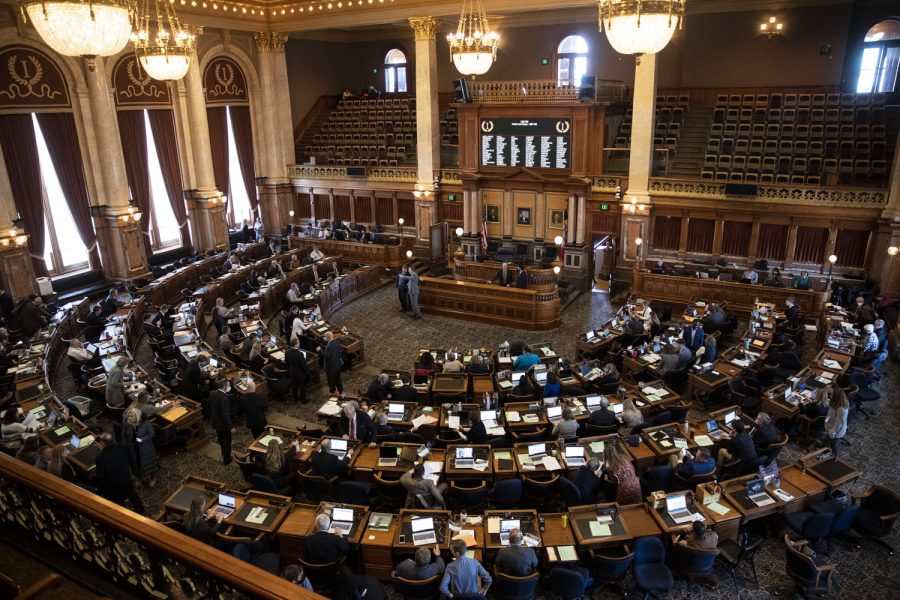Iowa House passes 4 percent flat tax bill
The Iowa House passed legislation that would lower the income tax to a flat 4 percent by 2026 on Wednesday.
Members of the House congregate in the House Chamber after the opening of the 2022 Legislative Session at the Iowa State Capitol in Des Moines, Iowa, on Monday, Jan. 10, 2022. Both the House and Senate Republican leaders said the priority of this session is to return tax funds and address workforce conditions.
February 16, 2022
The Iowa House of Representatives passed an income tax reform bill that looks to change the state income tax to a flat rate of 4 percent by 2026.
The legislation, introduced by Rep. Lee Hein, R-Jones, passed 61-37 and will be sent to the state Senate. The bill is similar to the tax plan proposed by Republican Gov. Kim Reynolds.
Hein said in his closing remarks that the tax adjustments were fair in his estimation, ensuring that no Iowan pays a higher percentage of their income.
“When you look at an example, a doctor who has spent a large amount of his time and money getting his education, only to have his high-income years taxed at a higher rate in some of the amendments we declined today,” Hein said. “Does that sound fair to you? It doesn’t to me.”
Hein also said the introduction of a flat rate of taxation still ensures that individuals who are making more money will be taxed more of their money, just not a higher percentage.
“Will they pay more in taxes? Absolutely?” Hein said. “But paying the same rate is fair.”
Hein said even an individual making more than a million dollars will still pay more than $40,000 in taxes, while a married couple with a child making $70,000 a year will only pay around $3,600 in taxes.
Hein said the tax cut was being considered based on a 3 to 3.5 percent growth each year for the next decade in response to a question from a Democratic representative.
Multiple Democrats in the House spoke against the bill.
Rep. Marti Anderson, D-Polk, said Iowans are already getting a break this year with reductions being implemented across all tax brackets. She also suggested the possibility of redistributing the surplus in tax money into other programs.
“We have to make sure kids don’t starve, like a couple of young girls we had a few years back,” Anderson said. “The amount that a single mom gets to help her get through the month, from us, from our state, has not increased since 1989.”
Anderson said the surplus in income tax should help legislators recognize that they are not using Iowans’ funds to “raise all the boats” across Iowa.
“People say that Iowans are nice and that we take care of our own,” Anderson said. “They would not see that in this bill.”
Rep. Matt Windschitl, R-Harrison, said the budget has been built over the past decade of Republican control and they have carefully ensured that the state is not spending more than it takes in.
“That’s not a surplus for the state to spend,” Windschitl said. “Iowans overpaid. That’s their money, not ours. The state doesn’t generate dollars, Iowans do through their hard work, through their labor.”
Windschitl said this bill would return money to Iowans in a sustainable and reliable manner, and the change to a flat, 4 percent tax would not stop the government from being able to fund the priorities of Iowans.
“This is Iowan’s money, they deserve to have it back,” Windschitl said. “We don’t need to be spending it on growing government.”
Rep. Dave Jacoby, D-Johnson, said the bill was a tax break for the rich, not low- and middle-income people.
Jacoby said, by his estimates, two-thirds of the money, $1 billion, would go to households earning over $4 million dollars.
Another Democrat, Rep. Sharon Sue Steckman of Mason City, said a person making under $10,000 a year would only save $12 under the bill, while someone with an income of $1 million would save $64,000.
“It’s kind of a reverse Robin Hood,” Jacoby said. “Rob from the poor, give to the rich.”















